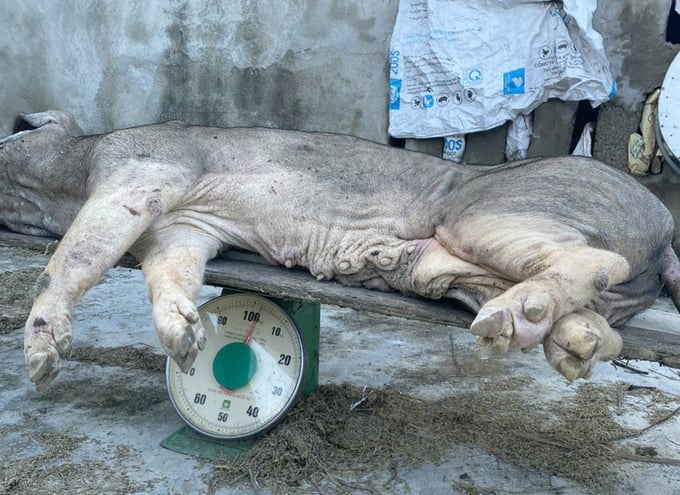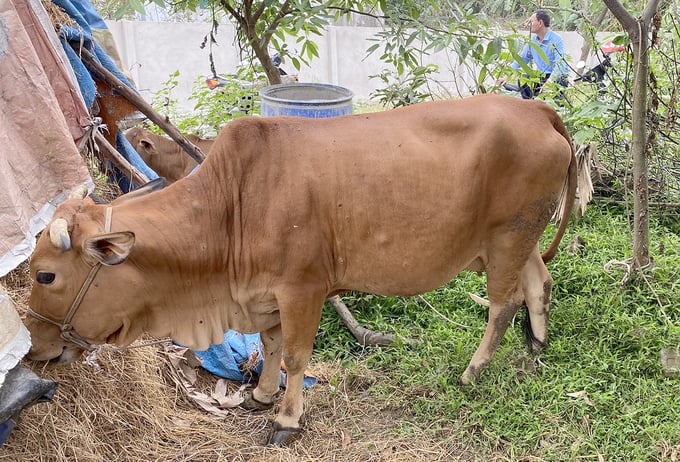June 18, 2025 | 01:05 GMT +7
June 18, 2025 | 01:05 GMT +7
Hotline: 0913.378.918
June 18, 2025 | 01:05 GMT +7
Hotline: 0913.378.918

After a three-year hiatus, support efforts for farmers with livestock affected by African Swine Fever found a new solution. Photo: Viet Khanh.
In accordance with Document No. 8108/VPCP-NN issued by the Government Office regarding support for damages caused by African Swine Fever and Lumpy Skin Disease, the Nghe An Provincial People's Committee instructed the Chairpersons of the People's Committees of districts, cities, and towns, as well as the Directors of local Departments of Agriculture and Rural Development, and Finance, to carry out support solutions transparently, ensuring accuracy and avoiding misuse or policy exploitation.
Furthermore, it is essential to publicly list households with affected animals for disposal. Relevant documents should be submitted to the district-level People's Committees (via the Departments of Agriculture and Rural Development, Departments of Economic Infrastructure, and Agricultural Service Centers) for review before submitting to the province's Department of Agriculture and Rural Development (via the Department of Livestock Production and Animal Health).
The documents must meet the conditions specified under Article 4 of Decree No. 02/2017/ND-CP issued by the Government regarding mechanisms and policies to support agricultural production recovery in areas damaged by natural disasters and epidemics. Cases not falling under the aforementioned clause will not be eligible for support.
In response to this issue, the agricultural sector of Nghe An province outlined guidelines to expedite the implementation process and prevent unnecessary delays. Accordingly, support rates for pig farmers are set at 38,000 Vietnamese dong per kilogram of live weight. On the other hand, support rates for buffalo and cow farmers are set at 45,000 Vietnamese dong per kilogram of live weight.

Farmers with livestock affected by Lumpy Skin Disease are also receiving similar support from the local governments. Photo: Viet Khanh.
Support for the disposal of pigs affected by the African Swine Fever will last from January 1, 2021, until the issuance of a decree on mechanisms and policies for preventing and controlling animal epidemics. Regarding support for the disposal of buffaloes and cows affected by the Lumpy Skin Disease before September 27, 2021, the local governments will conduct a comprehensive data synthesis to suggest appropriate solutions.
Nghe An province has recorded its first case of African Swine Fever in 2019, and its first case of Lumpy Skin Disease in 2021. Following the Prime Minister's issuance of policies and support rates for each year (Decision No. 793/QD-TTg dated June 27, 2019; Decision No. 2254/QD-TTg dated December 30, 2020), the province directed stakeholders to promptly disburse nearly 150 billion Vietnamese dong to households with disposed pigs affected by the African Swine Fever in 2019 and 2020.
For the following three years, the African Swine Fever has continued to affect local livestock production. However, due to the prioritization of funds for COVID-19 prevention, support policies for livestock diseases during this period were halted, posing a significant challenge to the livestock sector nationwide. Nghe An province, with one of the largest livestock populations in the country, has been heavily affected by the cessation.
During these three years, the African Swine Fever and Lumpy Skin Disease have led to widespread disposal of livestock in various provinces and cities, resulting in an estimated total loss of over 96 billion Vietnamese dong. The prolonged epidemics, lasting for five consecutive years, has forced many households to abandon their profession and their farms. Conversely, persevering farmers were forced to reduce their herds to mitigate risks.
As a result of the delay in support disbursement, farmers often neglect disease outbreaks and fail to report them to local governments and specialized agencies. This issue has been a significant factor contributing to the recent increase and spread of African Swine Fever in Nghe An province.
In the context of these pressing challenges, the government's plan to "support livestock farmers affected by African Swine Fever and Lumpy Skin Disease" is regarded as a new and innovative solution after an extended period of hiatus, thereby alleviating pressure faced by the farmers.
Mr. Pham Hoang Mai, Director of the Agricultural Service Center of Que Phong District, shared, "In accordance with the directives from the local government, the Center has promptly coordinated with relevant parties to implement each step according to regulations. Preliminary data will be publicly disclosed, and thoroughly cross-verified before we arrive at an official conclusion to ensure objectivity and transparency."
Translated by Nguyen Hai Long

(VAN) The results of national programs are essential for establishing a contemporary livestock sector that is well-equipped to meet the demands of both domestic and international markets, with robust biosafety standards.

(VAN) The UNESCO Global Geopark revalidation of Non nuoc Cao Bang and the transition to a two-tier administrative model are presently undergoing a pivotal moment in Cao Bang, the northernmost province of Vietnam.
/2025/06/13/5330-2-004539_953.jpg)
(VAN) Changing policy mindset and removing investment barriers are urgent requirements to open up new development space for enterprises in the agricultural sector.

(VAN) The areas include the restoration of five million hectares of marine ecosystems.

(VAN) Dr. Le Van Nguyen, Director of the Institute of E-Commerce Management (ECM), emphasizes the potential for green development through the cultivation of fruit trees, particularly in provinces such as Son La.

(VAN) VAAS and numerous Vietnamese enterprises have signed cooperation agreements with Japanese partners to promote agricultural technology and trade connectivity.
/2025/05/29/5625-12-214801_567.jpg)
(VAN) Provincial mergers in the Mekong Delta promise to streamline administration, expand inter-provincial raw material areas, and foster close linkages in agricultural value chains, benefiting both businesses and cooperatives.